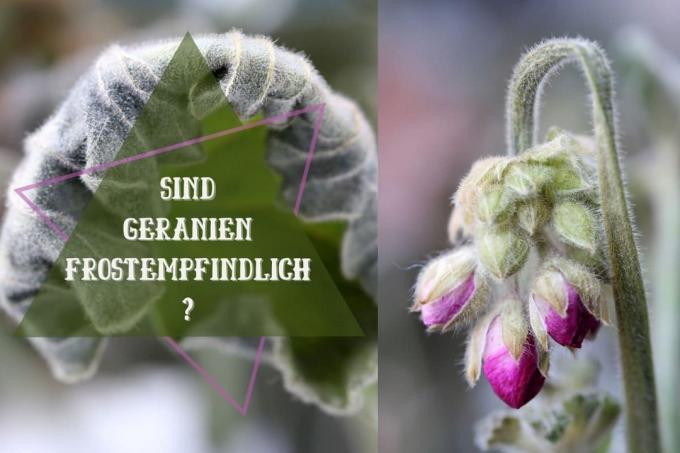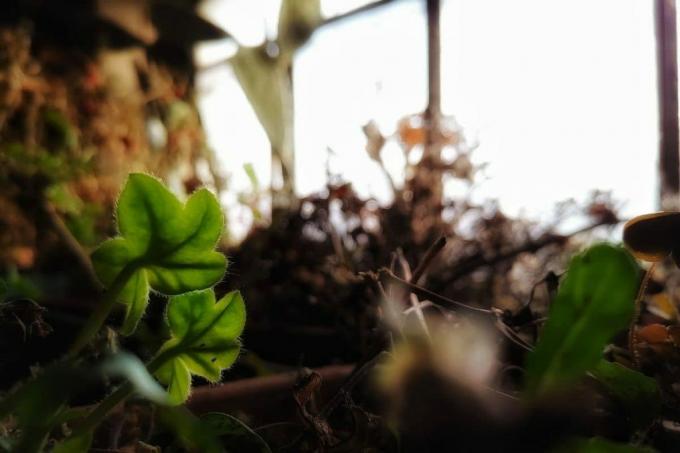
table of contents
- Geranium or pelargonium
- Plant out after ice saints
- Protection against night frosts
- Overwinter frost-free
- frequently asked Questions
Geraniums are popular and easy-care summer flowers on the balcony. What they cannot tolerate, however, are low temperatures. Only a cold night can kill the frost-sensitive geraniums, which is why you should take precautionary measures in good time.
In a nutshell
- Geraniums are sensitive to frost, only some varieties are a little more tolerant
- Plant only when there is no risk of frost
- Protect plants from night frost during the transitional periods
- Pelargoniums can be overwintered with a little effort
Geranium or pelargonium
Geranium or pelargonium is often used as a synonym. However, these are different genres. This use as a synonym is sometimes used by the trade and hardy pelargoniums or geraniums are offered.
Pelargoniums originally come from Africa and are by no means hardy. They survive sub-zero temperatures only for a short time, but not all night. What does exist, however, are hardy species of the genus "geranium". Often these are native cranesbills, which are botanically also referred to as geranium. Although both genera belong to the same plant family, there is still a difference in how sensitive they are to frost.

Note: If you are not sure which genus it is exactly when you buy it, ask the specialist whether the plants are hardy and how long they can actually tolerate frost.
Plant out after ice saints
The geranium is sensitive to frost and should therefore only be planted when low temperatures are no longer expected. This is the case around the time after the last ice saints in mid-May. Regionally, however, it can still get cool after this point in time and to avoid frost damage, you should protect the plants at night in endangered regions.
The situation is different in regions with a wine-growing climate, for example. Here the pelargoniums can go outside permanently earlier. There are only two species that are less sensitive to frost and can withstand lower temperatures for a few hours.
These are:
- Pelargonium violareum
- Pelargonium endlicherianum
Note: Although the plants can tolerate slightly lower temperatures, flowers or flower buds that have formed at this time can be damaged by frost and fall off.

Protection against night frosts
If you want to put the pelargoniums on the balcony early in spring, you should protect the plants from freezing temperatures at least at night. As a rule, it is already so warm during the day that there is no longer any risk of frost damage.
At night you can prevent it with simple means:
- Cover plants with winter fleece
- Place plants in frost-free rooms at night
With these simple means, you can leave the plants on the balcony much longer in autumn. However, you should not overlook them in good time to protect them, because especially in autumn when the humidity is very high, condensation on the leaves can cause great damage.
Overwinter frost-free
Geraniums, even if they come from warm Africa, are actually perennial. If you have the opportunity, you can overwinter the plants. However, this requires some preparation. First and foremost, however, you should provide suitable winter quarters.
Frost-free rooms such as:

- basement, cellar
- Storage rooms
- bright cool rooms
The preparations you made for wintering of frost-sensitive geraniums depend on the light conditions available to the plants in their winter quarters.
These preparatory work must be done in bright rooms:
- strong pruning
- remove all flowers and buds
- check for pests
- light fertilization
- water constantly but moderately
If you winter the plants in a dark basement, make these preparations:
- strong pruning
- Remove flower stems
- Perform pest control
- keep moderately moist

When wintering in the cellar, it is particularly important that you also remove the leaves in advance. The plant cannot photosynthesize in the cellar. This means that over time, the leaves will turn yellow and the plant will shed them. If you remove the leaves in advance, you will save the plants a lot of strength.
frequently asked Questions
Yes, the plants survive the time in their winter quarters much better if they are already used to the temperature.
As long as the plants are not in danger from freezing temperatures, they can stay outdoors. If temperatures are also forecast to be low during the day, they should move to their winter quarters.
Yes, as long as the greenhouse is well insulated and the frost cannot damage the plants even at night.
